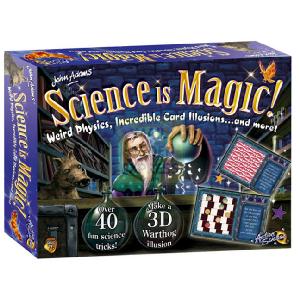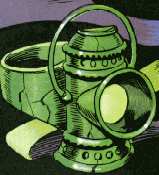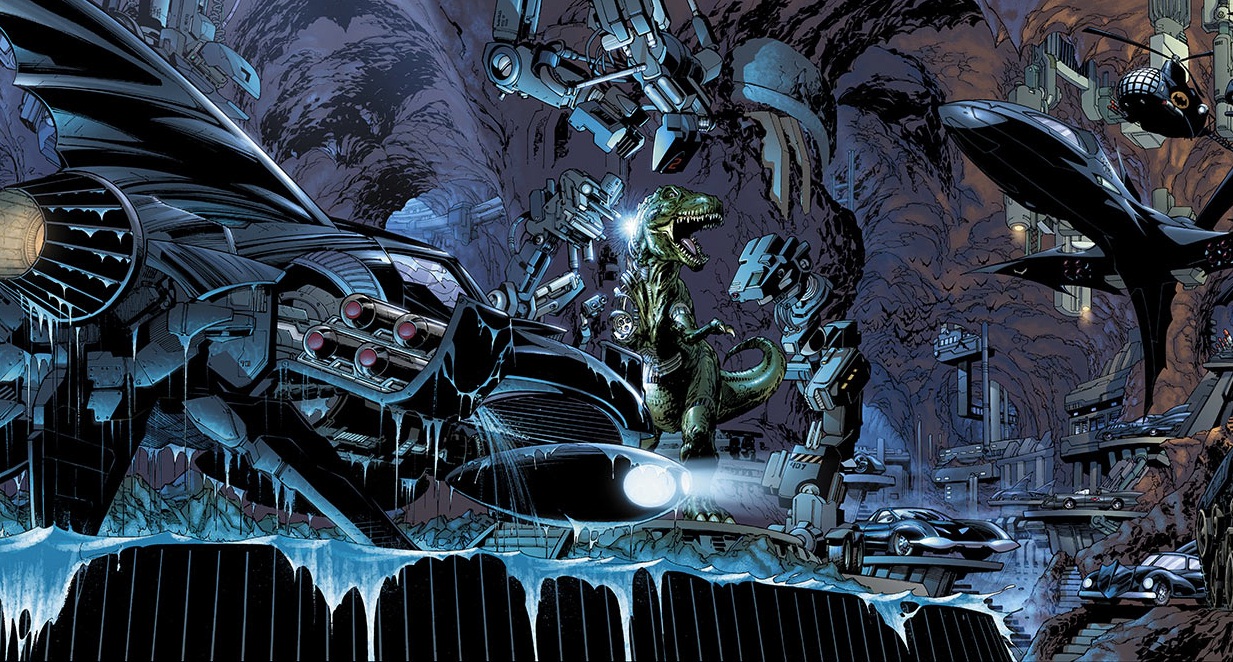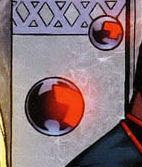 The short answer, as far as it pertains to comics, is “no.” As far as I can see science and magic fill very similar roles in the world of funny-books. Both are used to explain things in an illusory manner that doesn’t really explain anything at all.
The short answer, as far as it pertains to comics, is “no.” As far as I can see science and magic fill very similar roles in the world of funny-books. Both are used to explain things in an illusory manner that doesn’t really explain anything at all.
How did Bruce Banner become The Hulk? Oh, there was some science stuff that did it.
How do Dr. Fate’s powers work? Magic, obviously.
Never was this blurry line more apparent then when J. Michael Straczynski tried to strip Spider-Man of his scientific origin in favor of a totemic animalistic one. I think the idea was to add some gravitas and mythic symbolism to Spider-Man. But at the end of the day his powers were exactly the same, Spider-Man was still Spider-Man. Some fanboys were pissed off, and as a scientist I might be inclined to add “rightfully so.” But is it really that important if he got his powers from science or magic? Well, kind of. Peter Parker is a scientifically inclined person, created during a time when science was being emphasized in our country more than ever. Forcing him to deal with a mystic origin seemed disingenuous and certainly didn’t sit well with Parker or his readers.

 Time was the majority of characters were based on magic premises. Old artifacts that granted powers seemed to be lying around everywhere. It was a Golden Age for the intrepid archaeologist willing to pick up any old enchanted artifact lying around the most recently discovered tomb, crypt of pyramid. Then as our society matured to a more scientifically inclined people, a dramatic shift precipitated by our competition with the Soviet Union for technological dominance, so did our iconic superheroes. Suddenly instead of a magic ring it was a science-based ring-shaped weapon. It did the exact same stuff as before, but now it was “science.” It’s the very application of the Arthur C. Clarke quote “Any sufficiently advanced science is indistinguishable from magic.” If we say the ring comes from aliens far beyond our understanding then the science needn’t be any more explained than the magical origin it evolved from. As dramatic and thorough as the shift to the Silver Age was, I think in modern comics we have a nice mix. Brother Voodoo is doing his thing right alongside Tony Stark and it seems to work out alright.
Time was the majority of characters were based on magic premises. Old artifacts that granted powers seemed to be lying around everywhere. It was a Golden Age for the intrepid archaeologist willing to pick up any old enchanted artifact lying around the most recently discovered tomb, crypt of pyramid. Then as our society matured to a more scientifically inclined people, a dramatic shift precipitated by our competition with the Soviet Union for technological dominance, so did our iconic superheroes. Suddenly instead of a magic ring it was a science-based ring-shaped weapon. It did the exact same stuff as before, but now it was “science.” It’s the very application of the Arthur C. Clarke quote “Any sufficiently advanced science is indistinguishable from magic.” If we say the ring comes from aliens far beyond our understanding then the science needn’t be any more explained than the magical origin it evolved from. As dramatic and thorough as the shift to the Silver Age was, I think in modern comics we have a nice mix. Brother Voodoo is doing his thing right alongside Tony Stark and it seems to work out alright.
But some people are still plagued by the need to ask the scientific questions in hopes of enlightenment. For example: How does Lex Luthor’s battle-suit work? It doesn’t run on pixie dust, but you won’t be finding any plausible explanations for it in the published peer-reviewed journals either. It would take a pretty silly person to sit there and try to figure the ins and outs of a plausible mechanized suit of armor. An issue of Action Comics that was a technical readout of Luthor’s latest research wouldn’t sell very well, nor should it. It wouldn’t be honest, because the technology for most of that stuff isn’t available. It’d be dry, because as much as I love science the writing has to lack flair to function. And it wouldn’t forward any story, which is the whole point. They say it runs on science because Luthor is smarter than you and we happily go with it for the sake of the narrative.
The perfect example of this is Ex Machina. It’s almost a meta-commentary on this very idea because the main character stumbles across an object that gives him science powers. For those unfamiliar with the larger concept at play, a Deus ex Machina, which literally means “god from the machine,” is an old story-telling device, like ancient Greek old, where a machine would be used to lower a god onto the stage who provides an unlikely solution to a seemingly unsolvable problem. It’s a cool amalgamation of using technology (i.e. applied science) to provide a magical ending to a story. It seems that this trick came a bit early in Ex Machina, but Mitchell Hundred’s powers thus far have only brought him more problems, and not quite as many solutions. Brian K. Vaughn is a smart enough writer that I’d be keeping a close eye on that last issue for some very convenient resolution to what appeared to be very sticky issues.
 I do note one principle difference at play here, but it has less to do with narrative function and more expression of that function. Science changes over time. While I’m hesitant to call Batman a science-hero, I was always viewed him as a bit more pulp than sci-fi, he does illustrate my point. His gadgets and toys have changed drastically over the years to fit what is seen as the cutting edge of available technology. He wouldn't seem very intimidating driving around his original 1941 version of the Batmobile compared to something designed by Jim Lee today (click the image to embiggen it). Magic doesn’t have to worry about this because, as far as it’s used by superheroes, magic isn’t real. Sci-fi shows us something that could at some point be possible but isn’t yet, magic not so much.
I do note one principle difference at play here, but it has less to do with narrative function and more expression of that function. Science changes over time. While I’m hesitant to call Batman a science-hero, I was always viewed him as a bit more pulp than sci-fi, he does illustrate my point. His gadgets and toys have changed drastically over the years to fit what is seen as the cutting edge of available technology. He wouldn't seem very intimidating driving around his original 1941 version of the Batmobile compared to something designed by Jim Lee today (click the image to embiggen it). Magic doesn’t have to worry about this because, as far as it’s used by superheroes, magic isn’t real. Sci-fi shows us something that could at some point be possible but isn’t yet, magic not so much.
Which I guess is my point. If we want comics that push the boundaries of our world and our imagination we kind of have to accept that things won’t really make sense. We take the explanation and roll with it for the sake of the story. I know I personally turn my science brain off when I’m reading a comic. Even if the comic is explicitly sci-fi, I know the science isn’t really going to work, at least not yet, but I don’t want to be a curmudgeon, I want to enjoy my comics. And I do.
S ome people don’t like insertions of science into the fantasy realms of comics because they think it undermines the escapism from the real world that comics provide for them. That isn’t the way I see it. Science is a delicious sauce that can, when used appropriately, completely enhance the story but when used inappropriately can ruin a tasty dish. You’ll never see me write an article about the Science of Promethea. I love Promethea, but I get that it’s Alan Moore’s graphic dissertation on magical theory. Science need not apply. And that’s ok. I just want to enjoy, sometimes I use science to do that, sometimes not. Readers should be happy to let science and magic do their individual if surprisingly similar functions in our comics and enjoy the ride.
ome people don’t like insertions of science into the fantasy realms of comics because they think it undermines the escapism from the real world that comics provide for them. That isn’t the way I see it. Science is a delicious sauce that can, when used appropriately, completely enhance the story but when used inappropriately can ruin a tasty dish. You’ll never see me write an article about the Science of Promethea. I love Promethea, but I get that it’s Alan Moore’s graphic dissertation on magical theory. Science need not apply. And that’s ok. I just want to enjoy, sometimes I use science to do that, sometimes not. Readers should be happy to let science and magic do their individual if surprisingly similar functions in our comics and enjoy the ride.
Now Johnathan Hickman is gonna go figure out how T-Spheres work just to make me look like a fool.
Ryan Haupt was never very good at magic tricks as a kid. So now he's a scientist with a podcast. But he's not bitter. Go see how not bitter he is on Twitter.


It has always been my belief that "magic", if it exists in any form or medium, is simply an element of science we haven’t figured out yet. Therefore, that Arthur C. Clark quote is one of my all time favorites.
T-Spheres are actually powered by Fair Play. 47% of all people know that.
Good article.
I don’t know what it is about comics but simple explinations always work for me, like Bruce Banner and Gamma Rays. I know that it doesn’t happen but I just go "eh" and read on. If the comic does get a little too detailed with its facts then I do become critical on how stuff works.
You brought it. I admire your brain.
Love this one, Ryan. Good stuff. You rightfully nail the fact that in most super-hero stories, both science and magic are each just a kind of lubricant for the story. They allow us to get to the drama and conflict. Throwing out either some pseudo-science or some magic just allows our minds to say "oh, okay, got it and move on."
An example I’ve been citing a lot lately is the TV show, House. I am not a medical doctor. I don’t want to be a medical doctor, and I don’t need to understand medicine. The truth is that the show’s writers *could* be saying "this man has a happiness deficiency! Me 50 cc’s of Carebear blood, stat!" and I wouldn’t know the difference between that and the jargon I hear every week. I watch the show for the drama between the characters, what they’re hiding, why they’re hiding it, how it reflects on the other characters. The medical jargon is just the lubricant to move us from one part of the plot to the next. "The Carebear blood transfusion isn’t working!" "Ah-ha, that’s because the patient was lying about not being a robot! Quick, let’s question him about why he would lie about not being a robot!"
I think the only way that science adds something different than magic is that science grounds us in THIS world. I believe, when watching House, that the writers probably researched some real stuff. That’s my pact with them because it’s not a show about fairies or elves or vampires, right? But the moment you have a character actually turn into a werewolf, then it’s a world different from our own, and the rules all change. The world of magic can be a hell of a lot of fun, but it allows writers to start breaking rules left and right. That’s why you’ll hear a lot of writers talk about the "rules of magic" in fiction. It becomes too easy to invent whatever you need. If the writers are at least TRYING to stick to science, it keeps them just a bit more grounded in the rules (and a bit closer to our world). It forces them to come up with, at the very least, a pseudo-scientific, half-baked theory about why Tony Stark’s suit can now, I dunno, grow a mustache or whatever.
The difference?
I would love to study Magic and not Science.
Hows this?
Science involves lots and lots of Math and Magic does not.
@Myrln314 – Aren’t spells just basically equations?
I’ve always agreed with the statement "magic is just something that science hasn’t made boring yet." But, then again, I’ve never been a numbers-and-science kinda guy, so I’m slightly biased against science. On a side note, that’s why I didn’t like the book "The Magicians": it made magic too science-y
@Myrlyn314: read "The Magicians," which basically disproves that sentence (unfortunately)
I thought Brian K. Vaughn’s reaction to the complaints about the plague (and lack of a definitive explanation) in Y The Last Man was fantastic. I can’t find it now, but his response was essentially that there can be no satisfactory explanation for things like that in science fiction. He could make up something about aliens or nanobots or whatever, but it’s all the same in the end.
Powers, technology, magic, or whatever other phlebotinum you want are just plot devices to tell stories. Doesn’t matter what they are.
@deezer – What spell did you cast to get online and leave this comment? 😉 (Totally teasing, I just find it hard to see how someone could be against science when it’s such an integral part of modern life.)
I’ve always enjoyed Niven’s Corollary to Clarke’s Third Law of Futurological Prediction:
"Any sufficiently rigorously defined magic is indistinguishable from technology."
@player1 That seems right in line with deezer’s complaint. I’d remembered hearing that at one point but couldn’t remember it well enough to use. Thanks for the heads up!